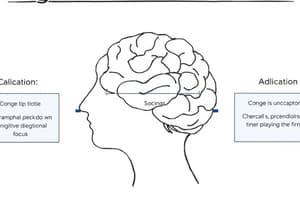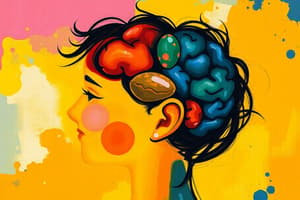Podcast
Questions and Answers
Who is known as the ‘father of adolescent psychology’ and what term did he use to describe adolescence?
Who is known as the ‘father of adolescent psychology’ and what term did he use to describe adolescence?
- G. Stanley Hall; ‘storm and stress’ (correct)
- H.S. Sullivan; ‘the importance of friends’
- Erik Erikson; ‘identity versus identity confusion’
- Sigmund Freud; ‘the phallic stage’
What marks the beginning of puberty?
What marks the beginning of puberty?
- Hormonal increases that manifest in a range of internal and external bodily changes. (correct)
- The knowledge that one is now a man or a woman.
- Social rewards for being an adult.
- None of the above.
Recent research indicates that currently who are most at risk of contracting HIV/AIDS in South Africa?
Recent research indicates that currently who are most at risk of contracting HIV/AIDS in South Africa?
- Men in the stage of middle adulthood
- Women in the stage of young adulthood (correct)
- Men in the stage of young adulthood
- Women in the stage of middle adulthood
What is true about the physical experience of middle and late adulthood?
What is true about the physical experience of middle and late adulthood?
What does senescence refer to?
What does senescence refer to?
According to Piaget, what can adolescents perform in terms of cognitive ability?
According to Piaget, what can adolescents perform in terms of cognitive ability?
What is fluid intelligence believed to do throughout adulthood?
What is fluid intelligence believed to do throughout adulthood?
What do personal myths refer to in adolescents?
What do personal myths refer to in adolescents?
According to Erik Erikson, what is the key issue for adolescents in their development stage?
According to Erik Erikson, what is the key issue for adolescents in their development stage?
Flashcards are hidden until you start studying
Study Notes
Adolescence
-
G. Stanley Hall is known as the "father of adolescent psychology" and used the term "storm and stress" to describe adolescence.
-
Puberty is marked by hormonal increases that lead to internal and external bodily changes.
-
Recent South African research indicates that young adults are at the highest risk of contracting HIV/AIDS.
Middle and Late Adulthood
-
Lower income, unskilled workers generally experience physical changes associated with middle and late adulthood earlier than higher income professionals.
-
Senescence refers to the decline in the body's systems during late adulthood.
Cognitive Development
-
Piaget suggested adolescents are capable of formal operational thinking, which allows them to think abstractly, idealistically, and logically.
-
Fluid intelligence, which refers to the individual's ability to analyze and solve problems, generally declines throughout adulthood.
Developmental Stages
-
Personal myths refer to adolescent beliefs about their uniqueness and specialness.
-
According to Erik Erikson, adolescents face the crisis of identity versus identity confusion during the 5th stage of development.
-
During middle adulthood, the primary psychosocial challenge according to Erik Erikson, is to balance generativity and self-absorption or stagnation.
Studying That Suits You
Use AI to generate personalized quizzes and flashcards to suit your learning preferences.




